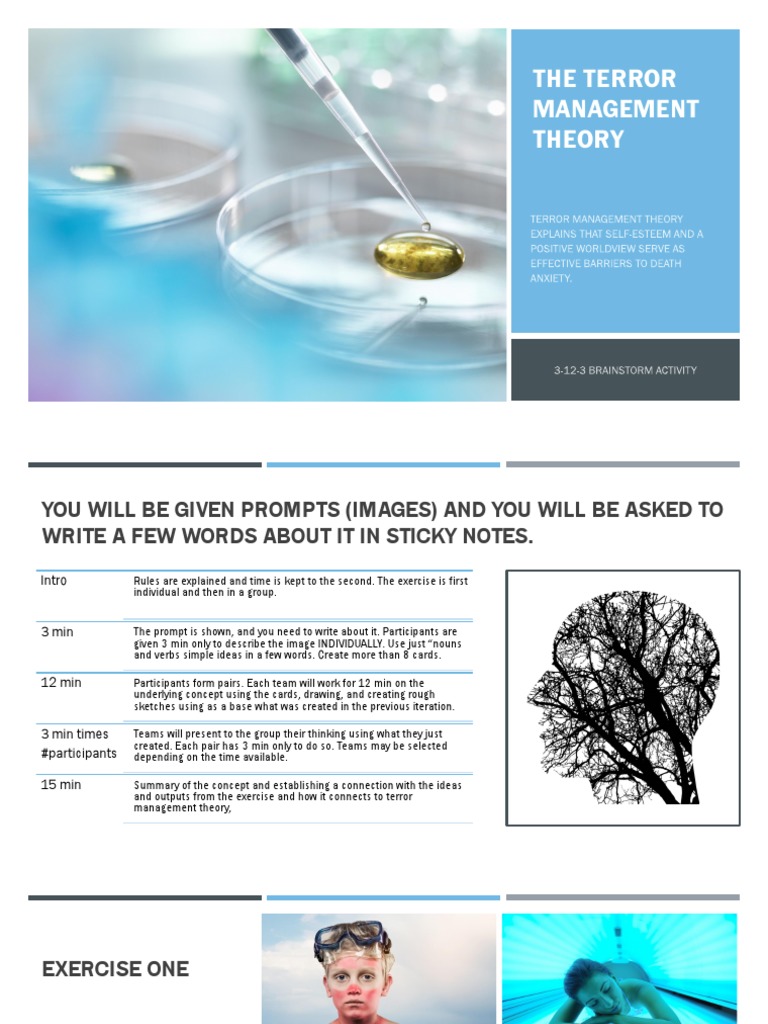The confluence of psychology and spirituality often elicits profound inquiry, particularly when exploring existential themes such as mortality. One such psychological framework, known as the Terror Management Theory (TMT), posits that the awareness of one’s mortality influences behavior, belief systems, and coping mechanisms. Against this backdrop, the Baha’i Faith offers a compelling perspective on life, death, and what lies beyond, inviting adherents and scholars alike to reevaluate the conceptualizations of the afterlife in light of divine teachings.
Terror Management Theory fundamentally addresses how individuals navigate the existential dread stemming from their inevitable demise. According to TMT, individuals adopt cultural beliefs and ideologies as a means to transcend the anxiety instigated by their mortality. These beliefs often manifest in various forms—be it through religion, national affiliation, or enduring contributions to society. In essence, these constructs function as a psychological buffer against existential angst. Such a theoretical framework provides fertile ground for a Baha’i exploration of the afterlife and its associated teachings.
At the core of Baha’i belief lies the assertion that life is a continuous journey of the soul towards the divine. Abdu’l-Baha, the son of Baha’u’llah, elucidates that this earthly existence serves merely as a preparatory stage for the eternal life that follows. Herein emerges a pivotal shift in perspective: rather than fearing death as an end, it is perceived as a transition—a transformative passage to a renewed state of existence. This reframing of death, as portrayed in Baha’i teachings, alleviates the trepidation associated with mortality, rendering it an integral aspect of the spiritual ascent.
Baha’i scriptures articulate a dualistic nature of existence, merging the material and the spiritual realms. The material world is transient, while the spiritual realm is perpetual. In this sense, the fear of losing one’s corporeal form diminishes when individuals comprehend their spiritual essence. The Baha’i Faith posits that human beings possess an immortal soul that persists beyond the physical demise. This belief fosters an intrinsic sense of purpose, wherein earthly actions contribute to the spiritual development essential for the afterlife.
Furthermore, Baha’i teachings elucidate the significance of moral rectitude and service to others as paramount considerations during one’s earthly sojourn. The choices made in this life not only affect the individual’s spiritual evolution but also reverberate through the annals of eternity. The principle of the oneness of humanity emphasizes interconnectedness and responsibility toward others, challenging adherents to live with compassion and purpose. In the Baha’i perspective, the afterlife is a continuation of the soul’s journey, marked distinctly by the cumulative impact of one’s earthly deeds.
Engaging with the ideals presented within this framework, individuals may find solace in the notion that living a life imbued with virtue and service ultimately prepares the soul for its journey in the afterlife. The teachings encourage fostering a legacy that transcends physical existence—cultivating love, unity, and understanding amongst humanity. This radically alters individuals’ engagements with life, hence diminishing the urgency of mortality as an existential crisis and instead framing it as an enlightening opportunity for growth.
Delving deeper, the teachings of Baha’u’llah articulate a vision of the afterlife not merely as a reward or punishment, but rather as a progressive approach in the soul’s journey toward perfection. The soul’s experience after death is described in intrinsic layers, evolving according to the spiritual maturity attained during one’s earthly existence. The Baha’i understanding of the afterlife encompasses a dynamic process of retribution influenced by conscious choice and moral action, thereby fostering a responsible and proactive approach to living.
Moreover, the dialogue between TMT and Baha’i teachings initiates transformative pathways in addressing the innate human fear of death. Where TMT suggests that cultural symbols and ideologies act as a bulwark against mortality, Baha’i belief challenges individuals to internalize a deeper understanding of their spiritual essence. Instead of accumulating external validations, Baha’is are called to embody a profound connection to their existence as part of the divine will. This internalization influences how believers engage with the transitory nature of life—tempering fear and instilling tranquility.
The integration of these perspectives further underscores the pivotal role of faith in navigating existential uncertainties. Faith, in the Baha’i context, is not simply a doctrinal affirmation but a profound commitment to the principles of unity, love, and service. This faith mitigates the starkness of human existence, replacing fear with purpose, and mortality with meaning. Adherents cultivate a holistic vision that nurtures both the personal and collective journey towards eternal existence.
In conclusion, the Baha’i perspective on the afterlife, juxtaposed with the insights from Terror Management Theory, beckons individuals to embark on an introspective quest. This intersection not only reinstates the notion of continuity beyond death but also enhances the engagement in a life characterized by virtue and service. Embracing these teachings invites believers to perceive death through a lens of opportunity rather than dread, thus reorienting their motivations and actions towards cultivating a legacy that resonates in eternity. The teachings of Baha’u’llah advocate for a transformative acceptance of mortality, challenging humanity to rise above fear—ultimately promising a shift in perspective that unveils the beauty of the soul’s perpetual journey towards the divine.
